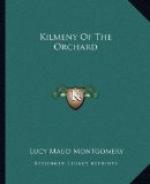“Neil, listen to me,” he said quietly. “You are talking very foolishly. It is not for you to say who shall or shall not be Kilmeny’s friend. Now, you may just as well control yourself and go home like a decent fellow. I am not at all frightened by your threats, and I shall know how to deal with you if you persist in interfering with me or persecuting Kilmeny. I am not the sort of person to put up with that, my lad.”
The restrained power in his tone and look cowed Neil. The latter turned sullenly away, with another muttered curse, and plunged into the shadow of the firs.
Eric, not a little ruffled under all his external composure by this most unexpected and unpleasant encounter, pursued his way along the lane which wound on by the belt of woodland in twist and curve to the Gordon homestead. His heart beat as he thought of Kilmeny. What might she not be suffering? Doubtless Neil had given a very exaggerated and distorted account of what he had seen, and probably her dour relations were very angry with her, poor child. Anxious to avert their wrath as soon as might be, he hurried on, almost forgetting his meeting with Neil. The threats of the latter did not trouble him at all. He thought the angry outburst of a jealous boy mattered but little. What did matter was that Kilmeny was in trouble which his heedlessness had brought upon her.
Presently he found himself before the Gordon house. It was an old building with sharp eaves and dormer windows, its shingles stained a dark gray by long exposure to wind and weather. Faded green shutters hung on the windows of the lower story. Behind it grew a thick wood of spruces. The little yard in front of it was grassy and prim and flowerless; but over the low front door a luxuriant early-flowering rose vine clambered, in a riot of blood-red blossom which contrasted strangely with the general bareness of its surroundings. It seemed to fling itself over the grim old house as if intent on bombarding it with an alien life and joyousness.
Eric knocked at the door, wondering if it might be possible that Kilmeny should come to it. But a moment later it was opened by an elderly woman—a woman of rigid lines from the hem of her lank, dark print dress to the crown of her head, covered with black hair which, despite its few gray threads, was still thick and luxuriant. She had a long, pale face somewhat worn and wrinkled, but possessing a certain harsh comeliness of feature which neither age nor wrinkles had quite destroyed; and her deep-set, light gray eyes were not devoid of suggested kindliness, although they now surveyed Eric with an unconcealed hostility. Her figure, in its merciless dress, was very angular; yet there was about her a dignity of carriage and manner which Eric liked. In any case, he preferred her unsmiling dourness to vulgar garrulity.
He lifted his hat.
“Have I the honour of speaking to Miss Gordon?” he asked.




